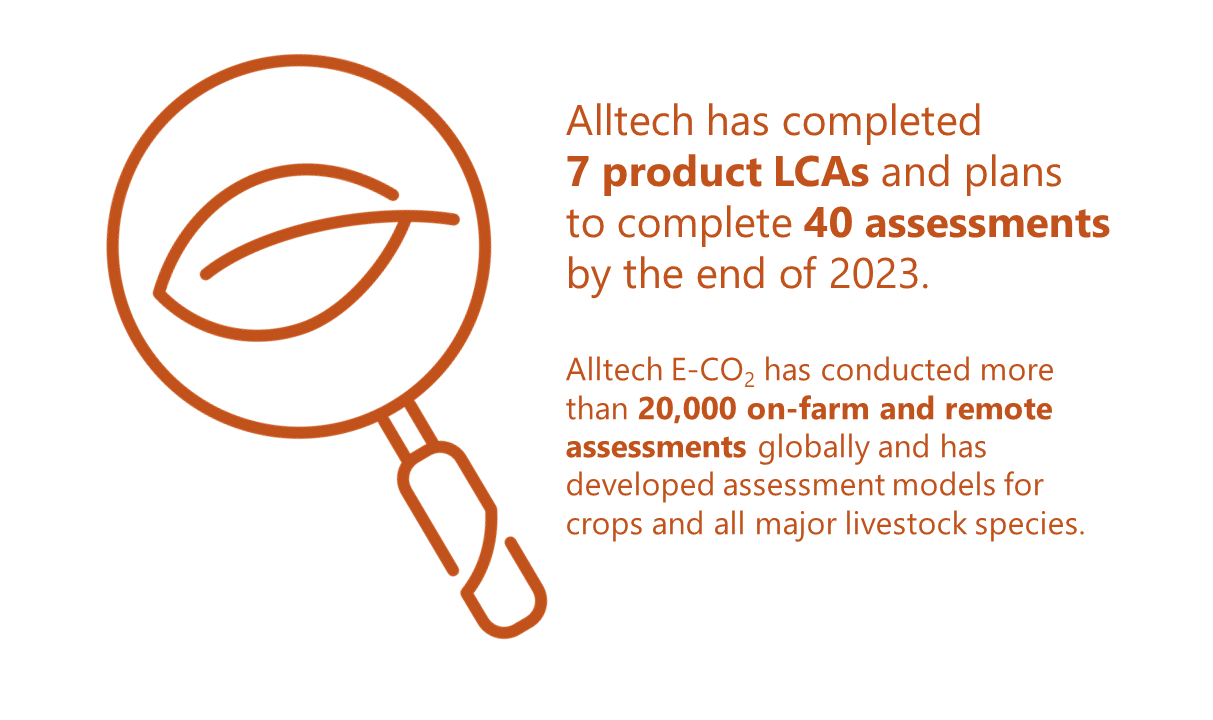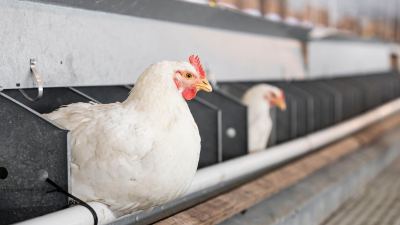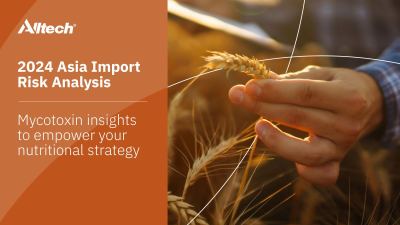Using LCAs to assess the environmental impacts of our technologies and facilities

Alltech has committed to completing life cycle analyses (LCAs) of our core nutritional technologies across all its manufacturing sites globally.
Alltech has completed seven product LCAs and plans to complete 40 assessments by the end of 2023.
LCAs quantify the environmental impacts associated with a product. The assessments consider all inputs including ingredients, energy, transport, packaging and all pollutants generated in the production of a product, from cradle to factory gate.
Alltech follows the LCA framework standard ISO 14067 in addition to guidance documents from the Livestock Environmental Assessment and Performance Partnership (LEAP). We also work with the Carbon Trust to ensure services provided through Alltech E-CO2 are independently verified to be in line with the product carbon footprint standards PAS:2050 and ISO 140067.

“Completing such assessments allows us to generate more accurate metrics on the environmental impact of our business activities,” said Dr. Stephen Ross, senior sustainability specialist, Alltech E-CO2. “Life cycle analysis requires us to look at energy consumption at the production level, revealing opportunities for process efficiency improvements, which will reduce energy consumption and greenhouse gas emissions.”
Rather than utilize an assumed value for cradle-to-grave analysis of products, Alltech utilizes cradle-to-factory-gate analysis, as through Alltech E-CO2, to conduct on-farm livestock carbon footprints that take into account the use phase of Alltech technologies.
In addition to product LCAs, Alltech has completed carbon footprint assessments for each of our production plants. We will update these carbon footprint scores annually. Alltech also has begun installing monitoring equipment to capture energy consumption data on individual product lines.
Alltech E-CO2 measures and helps reduce agriculture’s environmental impact
The E-CO2 Project was established in 2009 to provide the agriculture industry with a tool to measure and manage environmental impact at the farm level. In the first few years of business, it pioneered the use of environmental tools and assessments to provide opportunities to benchmark and improve on-farm efficiency, thereby leading to increased profitability and sustainability.
The E-CO2 Project joined the Alltech family of companies in February 2015 and became Alltech E-CO2, with a goal of expanding to more locations and offering additional services. Today, Alltech E-CO2 serves a wide range of customers, from individual farms to multinational organizations in multiple countries.
Alltech E-CO2 has conducted more than 20,000 on-farm and remote assessments globally and has developed assessment models for crops and all major livestock species.
Certified environmental assessments provide a wealth of in-depth data on animal production, health, feed, fertilizer, nitrogen balance, water, energy and resource use. The data collected is used to deliver practical on-farm and online programs, as well as benchmark reporting, with clear and concise consultancy advice to lower the producer’s carbon emissions.
Helping feed manufacturers reduce their carbon footprint
Alltech E-CO2 launched the Feeds EA™ (environmental assessment) model to help feed manufacturers and producers globally measure and lower the carbon footprint of their feed. Feeds EA measures the environmental impact of feed production at the feed mill level by assessing the impact of existing compounds or blends. This is determined by calculating greenhouse gas emissions from production, cultivation, processing, energy utilization and transportation in the manufacturing of the feed. Feeds EA can calculate emissions from a database of more than 300 ingredients, including raw materials, soya products, byproducts and additives.
“Optimizing the sustainability of feed production provides a huge opportunity for the whole supply chain,” said Ben Braou, business general manager for Alltech E-CO2. “By utilizing Feeds EA, feed manufacturers are provided with the means to further enhance their product range and sustainability credentials through supplying feed with a lower environmental impact.”
Demonstrating our sustainability commitments
The 2022 Alltech Sustainability Report shares our sustainability journey through the lens of the three main objectives of Working Together for a Planet of Plenty™:
- Replenishing the planet’s natural resources
- Providing nutrition for all
- Revitalizing local economies
Download and read the report at alltech.com/sustainability.















